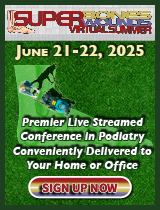|
|
|

|
Search
05/19/2025 H. David Gottlieb, DPM
Do We Really Have A Medical Degree (IRV Luftig, DPM)
Dr. Luftig, and others. raise some points to
consider regarding our degree, choice and scope of
individual practice, and how this all relates to
current training as the 4-4-3 model is.
When I started podiatry school in 1978, I did so
with the understanding that after 4 years of
schooling I would join a family practice of
general practice podiatry going back to 1934.
After about 20 years of some forefoot surgery,
orthotics and lots of corns, callouses and
toenails, board certification by ABPM, I realized
that I no longer found podiatry to be rewarding. I
then retired from practice for the first time and
tried to join one of the many biomedical companies
in my area. After many applications over 2 years I
received one very brief interview. Deciding that
the temporary positions I had taken to maintain
some income [substitute teaching and restaurant]
it became clear that my only real option was to
resume podiatry in the early 2000s but at a
different level than previously.
In order to be competitive with the then current
graduates, I knew that I needed current residency
training. At that time, as now, there were more
program positions than graduates and I entered
residency in 2005 intending, so I thought, to
perform rearfoot [hindfoot is the standard medical
jargon] surgery. After completion of the program I
did hindfoot surgery but after a few years i
realized that my expertise and interest was really
in dealing with diabetic and lower extremity ulcer
treatments more than anything else.
My point is that one does not really know where
their true passion is at the beginning of their
career. Without the training and developing the
expertise in all phases of practice one is not
able to grow towards their fulfillment. The 4-4-3
allows for this personal growth. Should residents
be exposed to more 'C&C'? Why? How many times must
one trim corns and callouses or perform nail
avulsions/matrixectomies to be proficient in it?
Less than a 4-4-3 model does not allow adequate
exposure in all phases of today's Podiatry. If the
need is to return to chiropody than do that, but
don't call it Podiatry.
Another reason for the 4-4-3 model is to comply
with State licensure requirements. Most States now
require 3 years of residency. This has come about
after many hard years of struggle State by State.
Some of this was by regulatory changes by
respective State Boards, some by changes to State
law. Many, most?, of these changes being opposed
and fought against by organized medicine many
times over many years. To change the clock back is
unrealistic and unreasonable.
The last reason, maybe the strongest, to maintain
the 4-4-3 model is financial support for
residencies by Medicare [except in Maryland which
is the only State with a Medicare exception since
its inception]. Medicare provides [or has, who
knows what will happen now?] funding for the
minimal post-graduate training required for Board
Certification. Board Certification by ABPM and
ABFAS requires 3 years of training. A residency
program with less than 3 years of training would
not qualify for Medicare reimbursement of the
direct and indirect expenses. Which are
substantial.
I do not speak for any of the podiatric
organizations, but I do speak for myself after 43
years post-graduation. Don't limit current
graduates. If the profession wants a purely
office-based, non-surgical profession that is
equal to the old chiropody then it has to create
it to exist alongside the current Podiatry. Yes,
this emulates the dentist-orthodontist-oral
surgeon model. But I haven't seen a podiatrist
refer a patient to a surgical podiatrist and get
that patient back for routine care.
H. David Gottlieb, DPM (retired), Columbia, MD
There are no more messages in this thread.
|
| |

|
|







